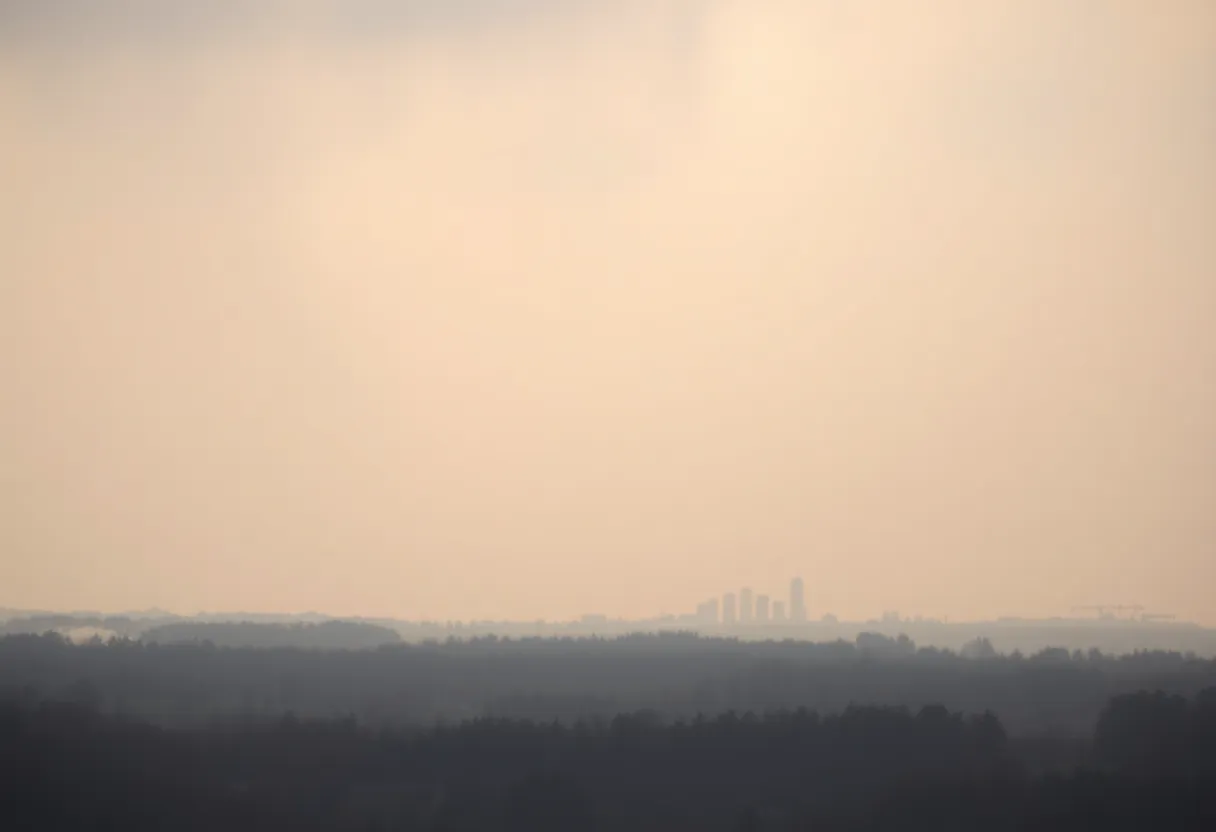News Summary
Rhode Island is experiencing air quality alerts due to smoke from wildfires in Canada, significantly impacting residents’ health. The state’s Department of Environmental Management advises vulnerable individuals to stay indoors. Meteorologists predict a hazy summer for the Northeast, with ongoing smoke posing health risks. The Department of Health urges precautionary measures such as limiting outdoor activities and wearing masks. With substantial wildfires across Canada, the air quality crisis could affect millions, emphasizing the need for awareness and safety measures.
Rhode Island is currently facing air quality alerts due to smoke drifting from devastating wildfires raging across Canada. This smoke is significantly affecting residents, leading to reduced visibility and a recognizable smell that can exacerbate health issues, particularly for vulnerable groups.
The Rhode Island Department of Environmental Management (DEM) has advised individuals suffering from asthma, lung disease, or heart conditions to remain indoors and keep windows closed to minimize exposure to the hazardous air. Additionally, drivers are encouraged to set their vehicle air systems to recirculate to avoid inhaling smoke while on the road.
According to forecasts from AccuWeather, the Northeast can expect a “hazy summer” resulting from the ongoing smoke from Canada. This persistent haze not only impacts health but is also expected to lower afternoon temperatures and decrease ultraviolet radiation levels at ground level.
Meteorologist Brett Anderson has indicated that the Northeast and mid-Atlantic regions could see occasional bursts of wildfire smoke until the end of August. This smoke poses significant health risks, including irritation of the eyes, nose, throat, and lungs, and may aggravate existing respiratory issues.
This year’s wildfires in Canada have been particularly devastating, with over 7 million acres of land burned so far. Experts predict that as many as 9 million acres could be torched in the U.S., surpassing historical averages. The smoke’s atmospheric presence can reduce sunlight, causing a temperature drop of 1 to 3 degrees when it settles to the surface, intensifying health risks.
Southern New England, including Rhode Island, has already begun experiencing haze from these Canadian wildfires. Current weather patterns, combined with the concentration of fires in western Canada, are leading to increased smoke exposure across New England.
So far this year, the DEM has not issued any alerts for unhealthy ground-level smoke, although several “unhealthy” air quality days have been recorded in previous years. Fine particulate matter from the smoke can penetrate deep into the lungs, triggering symptoms such as coughing, sneezing, and shortness of breath, particularly in vulnerable groups such as older adults, children, and those with pre-existing lung or heart conditions.
The Rhode Island Department of Health is urging residents to stay informed about air quality conditions and forecasts. Recommendations include staying indoors, limiting outdoor activities, wearing properly fitted N95 masks when outside, and utilizing air filtration systems to help mitigate smoke inhalation.
Air Quality Alerts have been declared not only in Rhode Island but also across neighboring states, including New York, Vermont, Massachusetts, New Hampshire, New Jersey, and eastern New York. Areas like Boston have reported an air quality index (AQI) of 155, which indicates unhealthy levels of air pollution, while cities such as Providence and Hartford also show readings that are unhealthy for sensitive groups.
The current atmospheric conditions are causing smoke to remain trapped near the Earth’s surface, which is aggravating air quality issues significantly. Although rain is anticipated to help push some of the smoke offshore later today, forecasts suggest that the return of wildfire smoke may be likely by early next week, requiring residents to remain vigilant regarding air quality.
With over 550 wildfires currently reported across Canada, mainly in the western and central regions, the implications for air quality across the U.S. are profound. Understanding the connection between these wildfires and local health advisories is crucial for the safety and well-being of residents during this ongoing environmental crisis.
Deeper Dive: News & Info About This Topic
- WPRI: Air Quality Alert in RI and MA due to Canadian Wildfires
- Wikipedia: Air Quality
- Providence Journal: Air Worsens Across Rhode Island
- Google Search: Rhode Island air quality
- Patch: Unhealthy Wildfire Smoke in Rhode Island
- Google Scholar: Wildfire Smoke Health Effects
- Fox Weather: Unhealthy Air Quality in Boston
- Encyclopedia Britannica: Air Pollution
- Providence Journal: Canadian Wildfire Smoke Threatens Rhode Island
- Google News: Canadian wildfires

Author: STAFF HERE PROVIDENCE WRITER
The PROVIDENCE STAFF WRITER represents the experienced team at HEREProvidence.com, your go-to source for actionable local news and information in Providence, Providence County, and beyond. Specializing in "news you can use," we cover essential topics like product reviews for personal and business needs, local business directories, politics, real estate trends, neighborhood insights, and state news affecting the area—with deep expertise drawn from years of dedicated reporting and strong community input, including local press releases and business updates. We deliver top reporting on high-value events such as WaterFire, Rhode Island International Film Festival, and Rhode Island Comic Con. Our coverage extends to key organizations like the Greater Providence Chamber of Commerce and Providence Warwick Convention & Visitors Bureau, plus leading businesses in finance and manufacturing that power the local economy such as Citizens Financial Group and Textron. As part of the broader HERE network, we provide comprehensive, credible insights into Rhode Island's dynamic landscape.





